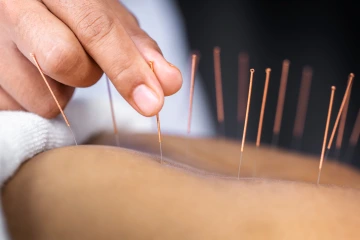Traditional Chinese medicine
TCM has been practiced for thousands of years. It is based on the concept of Qi (vital energy), balance of yin and Y\yang, and the five elements. The goal is to restore harmony and balance in both body and mind.
TCM can provide valuable support during and after a cancer diagnosis. It is often used as a complimentary approach to help reduce side effects of treatment, strengthen the immune system, and promote emotional wellness.

Acupuncture
Research supports the use of acupuncture to help manage treatment related side effects such as pain, nausea, and fatigue.
Tai Chi / Qigong
Tai Chi / Qigong has been shown to reduce stress, fatigue, and anxiety, improving sleep, mood, balance, cardiovascular health and overall quality of life.
Herbal Medicine
Herbal Medicine is used to help manage symptoms and side effects of cancer treatment. Some formulas may support recovery and improve energy. TCM herbs are typically personalized and should be used under the guidance of a qualified expert or healthcare professional.
Dietary Therapy
Dietary Therapy uses food as a tool for healing, to support digestion, strengthen
the body and enhance recovery during and after cancer treatment. It incorporates the concept of yin and yang to create balance within the body and promote overall health and vitality.



